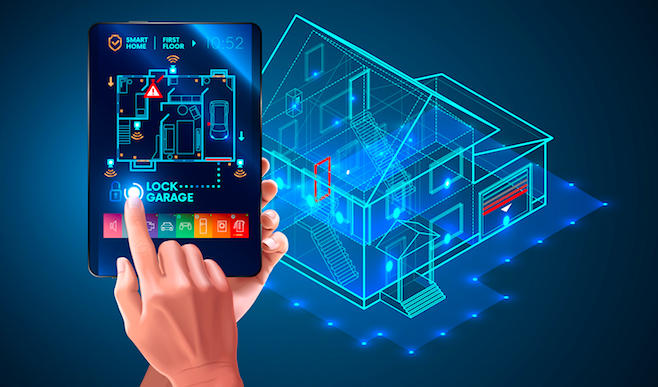Smart Home Technology and Its Influence on Property Value

Introduction to Smart Home Technology
Smart home technology has rapidly evolved from a futuristic concept to a mainstream reality. With innovations in connectivity and automation, homes equipped with smart devices offer unparalleled convenience, security, and energy efficiency. The integration of these technologies not only enhances the living experience but also plays a significant role in determining property values. Understanding the various aspects of smart home technology and how it influences property value is crucial for homeowners, buyers, and real estate professionals.
Understanding Smart Home Technology
Smart home technology refers to a range of devices and systems that can be controlled remotely or automatically to manage various home functions. These include lighting, heating, security, entertainment systems, and more. The core of smart home technology is its ability to connect to the internet and other devices, creating a seamless and integrated living environment. As these technologies continue to advance, their impact on property value becomes increasingly evident.
Key Components of Smart Home Technology
When discussing smart home technology, it’s essential to understand its key components. These components include smart thermostats, lighting systems, security cameras, door locks, voice assistants, and home automation hubs. Each of these devices contributes to the overall functionality and appeal of a smart home, enhancing both convenience and security. The more integrated and comprehensive a smart home system is, the more likely it is to positively influence property value.
The Growing Demand for Smart Homes
The demand for smart homes has been on the rise, driven by the increasing desire for convenience, energy efficiency, and security. As more homeowners seek to incorporate these technologies into their properties, the market for smart home devices continues to expand. This growing demand is a significant factor in the rising property values associated with smart homes. Buyers are often willing to pay a premium for homes equipped with the latest smart technology, recognizing the long-term benefits of such investments.
How Smart Home Technology Enhances Property Value
Smart home technology can significantly enhance property value in several ways. First, it offers improved energy efficiency, which can lead to lower utility bills and a reduced carbon footprint. Second, it provides enhanced security features that can deter potential intruders and protect the property. Third, the convenience of being able to control home functions remotely adds to the overall appeal of the property. These benefits collectively contribute to an increase in property value, making smart homes a wise investment for homeowners.
Energy Efficiency and Its Impact on Property Value
One of the most compelling reasons for adopting smart home technology is its potential to improve energy efficiency. Smart thermostats, lighting systems, and appliances can all be programmed to optimize energy usage, leading to significant savings on utility bills. Homes that are equipped with energy-efficient smart technology are often viewed as more desirable, particularly in a market where environmental consciousness is growing. This increased desirability translates to higher property values, as buyers are willing to invest in homes that offer long-term savings and sustainability.
Read also: Top Hotel Trends for 2024
Security Features and Property Value
Security is another critical aspect of smart home technology that can influence property value. Smart security systems, including cameras, motion detectors, and smart locks, provide homeowners with peace of mind by allowing them to monitor and control their property remotely. These features are particularly attractive to buyers, especially in areas where security is a concern. A home equipped with advanced security technology is likely to be valued higher than one without, as it offers added protection and reassurance.
The Convenience Factor: A Key Selling Point
Convenience is a major selling point for smart home technology. The ability to control various aspects of a home—such as lighting, temperature, and security—through a smartphone or voice command is a significant draw for potential buyers. This level of convenience enhances the living experience, making the property more attractive and, consequently, more valuable. As technology continues to evolve, the convenience offered by smart homes will likely become an even more critical factor in property valuation.
Smart Home Technology and Real Estate Trends
The influence of smart home technology on real estate trends cannot be overstated. As more buyers prioritize homes with integrated smart technology, the real estate market is adapting to meet this demand. Real estate agents are increasingly highlighting smart features in their listings, recognizing that these features can be a key differentiator in a competitive market. Properties with comprehensive smart home systems are often listed at higher prices and tend to sell faster than those without. For agents looking to capitalize on this trend, utilizing the best CRM for real estate investors can streamline the process of managing and marketing these high-tech properties.
Case Studies: Smart Homes and Property Value Increases
Several case studies demonstrate the tangible impact of smart home technology on property values. In many instances, homes equipped with advanced smart systems have seen significant increases in value compared to similar properties without such features. These case studies highlight the importance of smart technology in the modern real estate market and underscore its potential as a valuable investment for homeowners.
Challenges in Valuing Smart Homes
Despite the clear benefits of smart home technology, there are challenges in accurately valuing smart homes. One of the main challenges is the rapidly changing nature of technology, which can make it difficult to assess the long-term value of smart devices. Additionally, not all buyers are equally tech-savvy, and some may not fully appreciate or utilize the technology available in a smart home. These factors can complicate the valuation process and require careful consideration by real estate professionals.
The Role of Smart Home Certifications
Smart home certifications are becoming increasingly important in the real estate market. These certifications, such as Energy Star or LEED, provide an official recognition of a home’s energy efficiency and smart technology integration. Homes with these certifications are often viewed as more desirable and can command higher prices in the market. As the adoption of smart home technology grows, the role of certifications in property valuation is likely to become more prominent.
Future of Smart Home Technology and Property Values
The future of smart home technology is bright, with continuous advancements expected in the coming years. As technology becomes more integrated and user-friendly, the influence of smart home features on property values is likely to increase. Innovations such as artificial intelligence, machine learning, and the Internet of Things (IoT) will further enhance the capabilities of smart homes, making them even more attractive to buyers and investors.
Investment Considerations for Homeowners
For homeowners considering investing in smart home technology, there are several factors to keep in mind. First, it’s essential to choose devices and systems that are compatible with each other and can be easily upgraded in the future. Second, homeowners should consider the resale value of their investment, focusing on features that are likely to appeal to a broad range of buyers. Finally, it’s important to stay informed about the latest trends in smart home technology to ensure that the investment remains relevant and valuable over time.
Smart Home Technology and Energy Efficiency Standards
Energy efficiency standards are becoming increasingly stringent, and smart home technology plays a crucial role in helping homeowners meet these standards. Smart thermostats, for example, can learn a homeowner’s schedule and adjust the temperature accordingly, reducing energy waste. As these standards continue to evolve, homes equipped with smart technology that enhances energy efficiency are likely to be viewed more favorably in the market, leading to higher property values.
Smart Home Technology and Sustainable Living
Sustainable living is a growing trend, and smart home technology is at the forefront of this movement. By reducing energy consumption, minimizing waste, and promoting efficient resource use, smart homes contribute to a more sustainable lifestyle. This focus on sustainability is increasingly important to buyers, particularly younger generations who are more environmentally conscious. As a result, homes that incorporate smart technology designed to promote sustainable living are likely to see an increase in value.
Impact of Smart Home Technology on Mortgage Lending
The influence of smart home technology extends beyond property value to areas such as mortgage lending. Lenders are beginning to recognize the added value of smart homes and may offer more favorable terms to buyers of such properties. For example, a home with a comprehensive energy-efficient smart system may qualify for green mortgages or lower interest rates. This trend is likely to grow as smart home technology becomes more widespread and its benefits more universally recognized.
Legal Considerations for Smart Homes
As smart home technology becomes more prevalent, legal considerations are also coming to the forefront. Issues such as data privacy, cybersecurity, and the transfer of ownership of smart devices during a home sale are becoming increasingly important. Homeowners and buyers need to be aware of these legal considerations to protect their investment and ensure a smooth transaction process. Real estate professionals should also stay informed about these issues to provide accurate guidance to their clients.
Smart Home Technology and Insurance Premiums
Smart home technology can also impact insurance premiums. Homes equipped with smart security systems, for example, may qualify for discounts on homeowners’ insurance, as they are considered lower risk. Additionally, smart water leak detectors and fire alarms can help prevent damage, further reducing insurance costs. As more insurance companies recognize the benefits of smart home technology, the potential for lower premiums becomes another factor that can positively influence property value.
Conclusion: The Growing Importance of Smart Home Technology in Real Estate
Smart home technology is no longer a luxury but a growing necessity in the real estate market. Its influence on property values is undeniable, as it offers numerous benefits, including energy efficiency, enhanced security, and convenience. As technology continues to advance, the impact of smart home features on property values will likely become even more pronounced. Homeowners and buyers alike should consider the advantages of smart home technology when making real estate decisions, recognizing its potential to significantly enhance property value.
FAQs
How does smart home technology influence property value?
Smart home technology influences property value by enhancing energy efficiency, security, and convenience, making homes more attractive to buyers. These factors collectively contribute to higher property values.
Are homes with smart technology more expensive?
Yes, homes equipped with smart technology are generally more expensive, as they offer additional features that enhance the living experience and provide long-term savings.
What types of smart devices increase property value the most?
Smart thermostats, security systems, and energy-efficient appliances are among the smart devices that can significantly increase property value due to their practical benefits and appeal to buyers.
Can smart home technology lower insurance premiums?
Yes, smart home technology, particularly security systems and water leak detectors, can lower insurance premiums by reducing the risk of damage or theft, which insurance companies recognize as valuable.
Is it worth investing in smart home technology for resale purposes?
Investing in smart home technology can be worthwhile for resale purposes, as it makes the property more appealing to modern buyers, potentially leading to a higher sale price.
What are the legal considerations when selling a smart home?
When selling a smart home, legal considerations include the transfer of ownership of smart devices, data privacy, and ensuring that all systems are reset or transferred to the new owner to protect their privacy and security.

